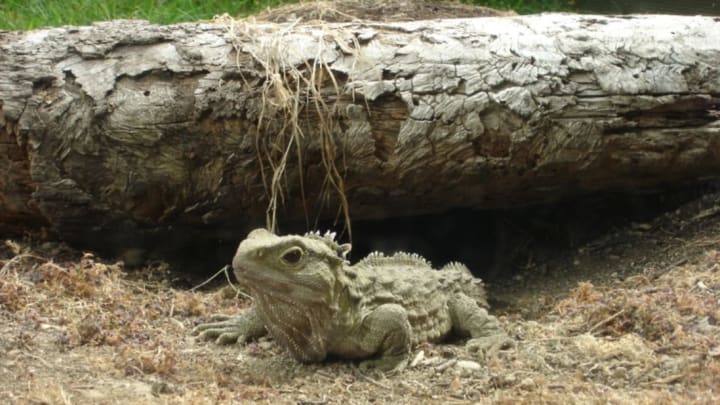In ancient Greek myth, Prometheus steals fire from the gods for the good of mankind. In modern New Zealand, certain reptiles pull a similar trick and steal heat for their own benefit. Their mark is no Greek god, but a little bird called the fairy prion.
Tuataras—which look like lizards but sit on a different branch of the reptilian family tree—can deal with lower temperatures better than most of their cousins, but are most comfortable when their bodies are around 60 to 70 degrees Fahrenheit. The temps in the forests they live in can dip well below that at night, so the animals have to warm themselves up again the next day. One way of doing that is basking in the sun. But that’s often a slow process, and can take a lot of time out of a reptile’s day. Surely there’s got to be a more efficient way of cranking up one’s body temperature.
Well, there is. One animal can take heat from another, a behavior called kleptothermy. It’s been documented a few times within different species, in cases that are both reciprocal (think of emperor penguins huddling together for warmth), and straight up theft (male garter snakes will mimic females so that other males huddle around them in an attempt to mate, warming the faker up). It’s only been seen happening between species once, though, when a lone sea snake was recorded sapping heat from birds.
Last year, ecologist Ilse Corkery added the tuatara to the list of interspecies heat-thieves. Since the 1800s, scientists have noted that the reptiles often share living space with seabirds, but no one really knew what to make of their strange relationship. After following tuataras around Stephens Island, New Zealand and taking temperature readings from those that bunk with birds and those that live alone, Corkery and her team have found that the tuataras seek out occupied bird burrows so they can hijack heat from them.
Between 2008 and 2011, the researchers made several trips to the island, catching 20 to 30 adult tuataras each time and tagging them with dataloggers that recorded their temperatures every 15 minutes. After the animals were released, the team followed them around and used “burrowscopes” to see where they were sleeping and if they were sharing the space with birds.
They found that many tuataras spent their nights in burrows made by fairy prions, often when the birds were still home. Those that had roommates maintained higher body temperatures for up to 15 hours the next day, thanks to the birds raising the air temperature inside the burrows. Staying warmer during the night lets the tuataras raise their body temperatures faster when basking the next day because they have a head start. The researchers say this heat boost and reduced time needed to bask in the sun likely buys the tuataras more time to forage for food and lets them grow faster and produce more little tuataras.
